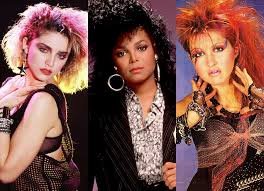Janet Jackson is Not “The Woman Who Flashed Her Boob at the Super Bowl”
AND HER FIRST NAME AIN’T ‘BABY’ EITHER
It’s been 19 years since I last watched a Super Bowl in the United States.
But I can still picture that day – February 1, 2004 – being at my friend’s house on Super Bowl Sunday.
As the halftime show began, sports fans across the country were filling up on chili, pizza, and spinach artichoke dip.
And then it happened – the most-talked about moment from the 2004 Super Bowl.
As Justin Timberlake and Janet Jackson closed the show to his song Rock Your Body, he moved his hand across Janet’s chest and tore off part of her red lace and black leather costume.
“Did we just see Janet Jackson’s boob?”
Ah yes, the 2004 Super Bowl is not remembered for who won (who even played?) or the clever commercials.
It’s remembered for the halftime show with the infamous ‘wardrobe malfunction’ – where Janet Jackson’s right breast was exposed to 140 million people watching at home.
And people went crazy.
I mean, CRAZY.
It’s hard to believe what a scandal it was at the time, but the reactions were so vitriolic and dramatic you might think Janet Jackson made a human sacrifice on the stage, while simultaneously burning an American flag and a Bible.
She was called a slut.
A whore.
And probably a lot of racist things that the papers couldn’t print.
The NFL celebrates a physical game where men tackle the shit out of each other.
Philadelphia Eagles linebacker Takeo Spikes tackles New England Patriots running back Kevin Faulk during an NFL game on Nov. 25, 2007, in Foxborough, Mass (Credit: AP Photo/Mary Schwalm)
It is a sport that has been tarnished with accusations of cheating players and coaches, and whose roster includes men who’ve been convicted of a myriad of crimes.
But the greatest scandal in the history of the NFL seems to be exposing an adult woman’s breast on television for 9/16 of a second.
(Never mind that the NFL has scantily clad young women cheering on the sidelines at their games).
CBS (the network that broadcast the show) was furious.
MTV (who produced the halftime show) was furious.
The NFL was furious.
And the FCC was furious – especially after more than 500,000 people complained.
There were fines – and there was punishment.
Most of it fell on Ms. Jackson.
And boy, was it nasty.
Though she issued public apologies in writing and on video, it was alleged that CBS Head Les Moonves felt she wasn’t ‘contrite’ enough.
Even a televised apology from Janet wasn’t enough
When CBS aired the Grammy Awards the following week, Janet, who was originally scheduled to appear in a tribute to Luther Vandross, did not attend.
Justin Timberlake, on the other hand did attend – and picked up the Grammy for best male pop vocal performance.
Janet released her eighth album, Damita Jo, a month later. But instead of being the darling of MTV and radio as she had been since 1986, she found herself in pop culture purgatory.
CBS, MTV, and Viacom all took a lot of heat over the Super Bowl incident, and they made Janet Jackson pay.
They blacklisted her from their channels (including music channels VH1 and MTV) and all their radio stations.
Damita Jo had been expected to out-perform Janet’s previous album – but didn’t even sell half as many copies. Unlike her previous five albums, Damita Jo had no #1 singles.
It wasn’t that the album was bad – it just wasn’t heard.
And Janet had only begun to serve her sentence.
Her next two albums received minimal or no rotation on music channels.
In 2018, it was revealed that Janet had been a years-long fixation for Moonves, who managed to blacklist her throughout his tenure at CBS – blocking not just her album sales, but other creative projects.
And this makes me sad.
Because for some people, the Super Bowl ‘wardrobe malfunction’ is all they know about Janet Jackson. It becomes her legacy.
People who didn’t grow up watching her on MTV in the 80s and 90s may not know who Janet Jackson was before that Super Bowl – or what she meant to people.
So allow me to tell you what Janet Jackson meant to me.
I was a young girl when I was introduced to Janet in 1986.
I loved music, listening to the radio, and watching videos on MTV.
And at that time, the three most successful female pop artists in America were Madonna, Cyndi Lauper, and Janet Jackson.
Madonna was outrageous – and so was Cyndi (though in a different way).
Janet was more accessible. She didn’t dress sexy. She wasn’t weird. She wasn’t scandalous.
She seemed like a nice girl, like she could be your friend or your big sister.
She came across as shy and sweet – but she also stood up for herself.
She told girls that we could be in control, that we should be treated with respect, and that we should wait for sex (Yes – at 20 years old, Janet Jackson sang a song called ‘Let’s Wait Awhile’).
But what I loved the most was watching Janet dance.
She and her brother Michael were fixtures of MTV back then, and I can still remember sitting in front of the TV waiting to see her videos, fascinated by the synchronized dance sequences (and marvelling at that chair move in The Pleasure Principle).
Her songs were fun to sing and dance to. You could listen to Janet with your friends – and your mom.
And if you weren’t in the US during that time, you might not know what a big deal Janet Jackson was.
Her 1986 album Control was one of the best-selling albums of the year, and had five hit singles.
A few years later, she topped its success with Rhythm Nation 1814. That album mixed social commentary with great hooks and dance beats.
Ask anyone who was into dance in the early 90s – we all tried to replicate the moves from the Rhythm Nation video.
I still want to learn this choreography
Rhythm Nation was both a creative and commercial smash. It broke records with seven singles making in the top five (including four #1 hits).
It stayed in the charts for THREE YEARS.
It also marked a drastic change for Janet Jackson.
In 1991, she released the final single from Rhythm Nation – Love Will Never Do – and that’s when Janet Jackson officially became sexy.
In the mid-80s, Janet had been called ‘thick’ and ‘chunky.’
She was pretty, but never considered sexy.
That changed when she showcased a new svelte frame, and danced in a bustier and ripped jeans with Antonio Sabato, Jr. in the Love Will Never Do video.
She played into her new image, and in 1993, posed for a risque Rolling Stone cover as she launched her album Janet.
The album was another smash, with six top 10 singles and sold 14 million copies.
Janet had been famous in the US, but the release of Janet made her a global star.
More female artists joined Janet’s domination of the charts in the 1990s – from Whitney Houston and Celine Dion to Shania Twain and Mariah Carey.
And you can see Janet’s footprints all over the young female talent that followed her – from Britney Spears and Beyonce to Lady Gaga and Rhianna.
Could Janet make an appearance during Rihanna’s Halftime Show?
Janet’s last #1 hit may have been in 2001, but her influence is still felt today.
And the happy memories of singing along to Control and Rhythm Nation and watching her dance are etched into my childhood.
The incident at the Super Bowl was a mistake – of judgment, and/or wardrobe.
But the greater mistake would be if people forgot about the talent and influence Janet Jackson had that earned her the invitation to be there.
*********************************************************************
Beth Collier helps companies, leaders and teams improve their communication, creativity, and leadership through consulting, coaching, and workshops.
She brings her clients global corporate experience, Midwestern practicality and enthusiasm – and an endless supply of pop culture references (including a few lessons inspired by Ms. Jackson).
To find out how she can help you become a more confident, creative, and compelling leader or improve communication in your company, visit www.beth-collier.com or drop her a line at beth@beth-collier.com
__________________________________________
Want a dose of positivity and fun in your inbox?
Sign up to receive my free newsletter, Curious Minds.
Each week you'll get insights that mix curiosity with business, history, or pop culture.











